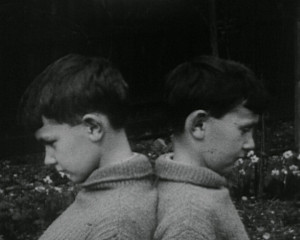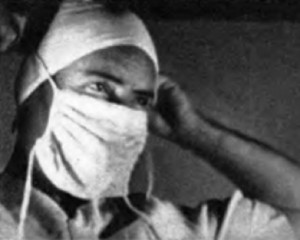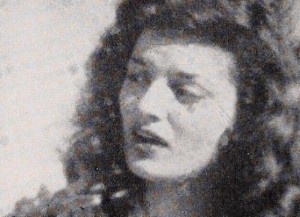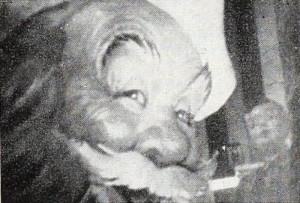A film capturing slices of everyday life, narrativizing Mori’s small children playing with each other.
"Members of the Morley family are seen walking through the countryside and a forest area. They are seen relaxing on a beach. Includes shots of the children paddling in the sea; making sand castles and watching a Punch and Judy Show. Continues with various activities talking place around a harbour. A group of fishermen are seen standing on the quayside - smoking, talking and securing their boats. Also features scenes of the countryside around Whitby and the lakes. Concludes with footage of a little girl playing on a homemade swing hanging from a tree; stroking a donkey in a field; playing pitch and putt golf and dancing around in circles with a woman; as they walk along a country lane" (NWFA Online Database).
"Whither Flowing," depicts the nervous evils caused by parents in the thoughtless upbringing of children. The drama was compactly told, well acted and directed, and was marked by unusual photography." Photoplay, Nov. 1929, 67. "...Whither Flowing is a psychological study of hysteria.... Dr. Heise's Whither Flowing won second award in the dramatic division of the recent Photoplay Magazine contest...” Movie Makers, Feb. 1930, 104.

"Amateur filmmaker, cinema historian and railway engineer H.A.V. Bulleid presents a comedy of manners featuring a mysterious arrival from a distant land. A family endure a group photograph, taken by their maid, but are interrupted by the arrival of a letter announcing the imminent visit of an Australian cousin named Kit, and his companion, named only as 'Pilkington'. The daughter speculates over the identity of Pilkington, hoping for a notorious Australian bushranger, but Cousin Kit arrives accompanied only by a large cardboard box. Inside is the answer to all their questions - a dog - the very same Mr. Pilkington. But will Kit and Pilkington upset the normal balance of the family? Or will the family only upset their Antipodean cousins? And will Kit achieve his aim of finding an English wife?" (EAFA Database)

"The Will and the Way is a simple story of '"little people" — but it looms large in its appeal to the human heart. There are, in its tender adventures, the laughter of sympathy and the tears of pathos. From these, as from any great expression of beauty, there comes the genuine and ennobling uplift of the spirit which is so rare in a workaday world. Chester Glassley has been equal to his task. His photography, both indoors and out, is as nearly flawless as skill and patience will permit. His camera treatment is marked by a wise concentration on close views, a dramatic selection of angles and a fine sense of matching and contrasting color values. Good cutting, paired with a brilliantly executed montage sequence, rounds out the technical achievements. But his greatest production triumph lies in the casting and direction of the two lead players, who bring to the amateur screen its most genuine and sensitive acting to date. A young wife is to have a baby. Because of a harsh experience with a rum sodden doctor, she turns blindly toward the thought of going only to a specialist, a great obstetrician, famed both for his fine care and his $1000 fees. Her young husband's reaction as he learns of this feeling is the simple theme of the entire story: "I don't know where we'll get the money, but if that's the doctor you want, then that's the doctor you're going to get!" From then on. life for the young couple is a race against time, punctuated for the husband by a frantic search for cash, which leads him through the indignities of a pie eating contest, the insults of '"amateur night" and the bruises and battering of a vastly unequal prize fight. But the baby wins in the end. The harried father collects only three hundred dollars of the specialist's fee, a sum he begs the great doctor to accept as a down payment. This the physician does, only to return the entire amount later — with a receipted bill — as his tribute to the boy's courage. The Will and the Way is a short, unassuming film, made technically with the simplest tools provided by the craft. But, in its unfailing imagination, its moving tenderness and. above all. in its deep understanding of the human heart, this film is a proud peer among its colleagues of the Hiram Percy Maxim Award." Movie Makers, Dec. 1940, 576-577.

"Any husband who has ever cast a wandering eye in the direction of a neighboring redhead should appreciate the husband and wife shenanigans related in The Wolf's Tale, by George A. Valentine. In addition to its redhead, and further complications, Mr. Valentine's film has the great merit of brevity, though it includes several travel shots and a little family background as well as its smoothly told story. Basically, however, the moral of The Wolf's Tale is: Leave redheads alone." Movie Makers, Dec. 1948, 495.

"Most Christmas films seem to be concerned with only one aspect of this December holiday — the gaiety of family life around the tree, opening presents and a festive dinner. Grace Lindner has recorded the material side of the season in the early footage of her film, Xmas Time, as she shows gleaming shop windows, hurrying shoppers, decorated doorways and members of her family around the hearthside. But in a smooth transition from a creche under the tree to the children saying their prayers, she ends her film with a series of architectural studies of the spires and bell towers of churches, filmed through bleak branches against a winter sky. This moving climax, accompanied by a choir recording of The Lord's Prayer, admirably fulfills her aim to portray the triumph of the spirit of Christmas over the baser observances." Movie Makers, Dec. 1951, 412.
Total Pages: 19